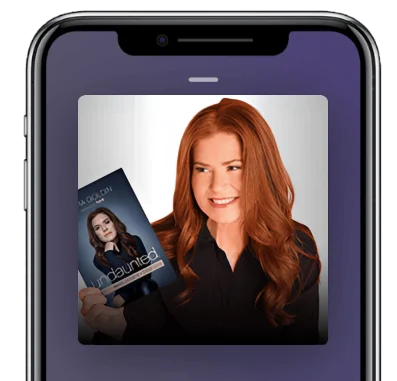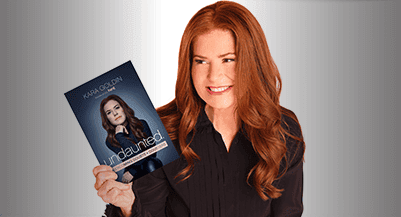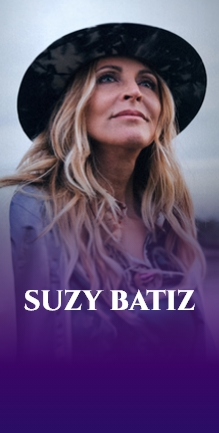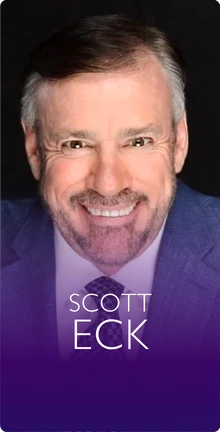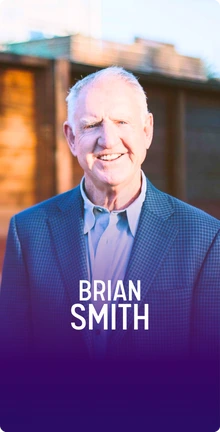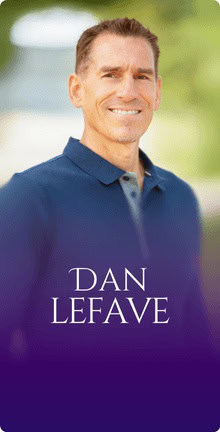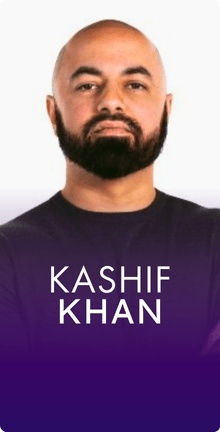In this Episode
- [00:39]Stephan introduces Kara Goldin. She turned her unsweetened flavored water into Hint, one of the most successful beverage businesses of our time. She has been named one of InStyle’s Badass 50 and EY Entrepreneur of the Year for Northern California.
- [05:06]Kara shares the story of how she closed a deal with Whole Foods for Hint on the same day she had a planned c-section on her fourth child.
- [10:20]Kara points out how building relationships can be done in many different ways, even if you’re just serving and connecting on a human level.
- [15:33]Kara tells us why she left her well-compensated corporate job to start a business in an industry where she had no experience.
- [20:40]Kara expresses her belief of looking back from past experiences and surrounding yourself with people who can satisfy your curiosity is how to grow in life and business.
- [26:57]Stephan and Kara talk about what a perfect vision is for a successful entrepreneur.
- [32:00]Stephan shares an interesting story of how a business owner was able to get his product on the shelves at Whole Foods by sneaking his products in.
- [38:21]Kara shares a vital lesson to put in mind as an entrepreneur and useful for your financial state.
- [45:11]Kara shares a moment where she gets goosebumps every time she thinks of it and reminds her of a time where she finally felt recognized for all of her hard work and perseverance.
- [51:14]Visit Kara Goldin’s website at KaraGoldin.com to grab a copy of her book, Undaunted: Overcoming Doubts and Doubters, to be confident in dealing with your fears.
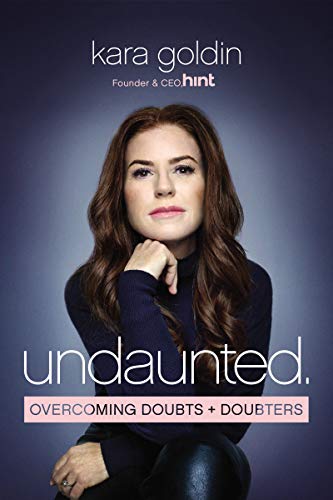
Kara, it’s so great to have you on the show.
Thanks for having me. I am excited to be here.
So we got to talk about Undaunted. This book is pretty unusual. There’s a whole genre of books out there from CEOs and founders about how to build a business from the ground up, how to turn an idea into a multi-million dollar business. But yours has a different take that’s a little unusual and very important and timely for what we’re going through these days.
It does. This book stemmed out of a journal. For those journalers out there and doodlers, that’s where this started. And I think, just through telling my own stories, what I’m hearing from so many people who have heard me speak about it, but also have read the book, have realized that they can do it, that I didn’t have everything figured out or I should say I did have failures along the way. I did have some challenges that I wasn’t sure how I would get through, but I knew that I needed to, or maybe not get through that one, but figure out another way to do something and not give up. The key thing that I’ve heard from people is that this book is so unusual, from not just an existing CEO but a female CEO, who is also the founder. There are people who are kind of sitting in C-suite and CEO level roles, to people kind of moving up into those positions are not hearing that things are hard. And yeah, we worked hard, but there were things that didn’t always go the right way. That was the main reason why I wrote the book. I wanted to not only share my stories because I wanted to get them out there and to write but also, more than anything; I felt that I was in a position to help people and not just how I did it, but also that you can do it. And it’s just you’ve got to figure out ways to do it.
Now, authors and CEOs, and business owners, tend not to share the embarrassing stories or the things that would make them cringe if that was told about them on the stage somewhere. But you kind of let it all out. Could you share one of those embarrassing stories so that our listeners could know how courageous you are and real?
I don’t know if it’s courageous or a little bit crazy, right? As Steve Jobs used to say, “Listen to those visionaries, those founders out there because they might seem a little bit crazy.” And one of the stories that come to mind that I share in the book is when I was getting the product on the shelf at Whole Foods, and I was pregnant with my fourth child. I had four children under the age of six when I decided to start Hint. I had made the commitment to myself about six months before starting Hint when I found out I was pregnant. I wrote a short business plan for Hint and decided, okay, I’m going to figure this out and launch it. And so I didn’t want to give in to the fact that I was having my fourth child, but then I went through the process and also the pregnancy, and then towards the end, I had this whole idea that the product would show up at my house after having it manufactured in a plant in Chicago. And it was supposed to come two weeks before my planned c-section. And the thing about launches is that they’re never on time. There’s always some kind of delay along the way. And that was the case with Hint.
I didn't have everything figured out. I had failures along the way, but I knew my only options were to figure out another way and not give up. Share on XI ended up getting the product the day before my planned c-section. I had pallets of water sitting in my garage. I lived in San Francisco at the time, and having parking inside of your house in a garage is a luxury. So I had my cars that were now trying to be parked out on the street. I’m having my baby, and it was just from a convenience standpoint. I needed to figure out a way to get the pallets out of my garage, but yet I was having a child. In the morning, I woke up and didn’t have to be at the hospital until 2 PM. I went over to my local Whole Foods and dragged my husband with me. He said, “You can’t carry the cases in. You’re having the baby this afternoon.” I ended up finding the guy that I had been talking to at Whole Foods, who was merchandising the shelves. He turned around, and I said, “Hi, do you remember me?” And he said, “Wow, you’re really pregnant.” And I said, “Yeah, I am.” And I went on to share with him the fact that I had met him a couple of months ago, and we had talked about this product that I was developing. And I’m sure he didn’t think that I was going to come back. But now, here’s this very pregnant lady standing right in front of him. And he said, “Are you going to have the baby in the store? Like any minute?” And I said, “Gosh, I hope not. I have to be at the hospital for a planned c-section at 2 PM.” And he said, “What’s a planned c-section?” And I said, “Do you mean the difference between a planned c-section and an emergency c-section? Because I’ve had both so that I can share both with you.”
And my husband, poor Theo, backed up into the fruits and vegetable section and thought, “Oh, my gosh, she’s going there. She’s going to explain where babies come from and what a planned c-section is.” So he went and took a loop around the store and just let me hang out there, watch the cases, and explain to this nice gentleman about childbirth. And 15 minutes later, my husband came back, and he said, “So, what’s the deal?” The guy was just in the process of saying to me, “Thank you so much for sharing that information with me.” And again, of course, my husband is horrified by the whole thing. I’m feeling pretty good because I’ve taken the time to educate somebody on childbirth. And that’s when I took the opportunity to ask him if I could get the product, some shelf space in the cooler and on the shelf, and he said, “There’s no guarantees, I’ll do my best.” And he liked me at this point because I had taken some time to kind of spend some time educating him on something that he was curious about, but I left the store not knowing whether or not I had a product on the shelf or a done deal, however you want to look at it.
People do business with people, not corporations doing business with other corporations.
And that’s when the next day, I got the phone call from after delivering my son Justin successfully. And he said, “I need you to get over here quickly. Your ten cases are gone.” And I said, “Who took them?” Because I didn’t see him put them on the shelf, so I wasn’t sure that they were actually on the shelf. And he said, “No, they were sold. But I’m going to get in trouble with my manager if you don’t resupply the shelves.” And so again, when I was in it, I didn’t think it was funny. I was just doing what I was doing. And he thought it was a little strange, but also the fact that he’ll probably never forget that the founder and CEO of Hint told him where babies come from. And I think that the lesson that I talked about in the book is that you build relationships with everybody, and sometimes building relationships is educating somebody. I mean, there’s a lot of people who might have said, “Oh gosh, I’m not going to talk to him about this.”
And they probably wouldn’t have gotten very far with him because he had decision-making power. But I didn’t go into the store thinking, “Okay, today I’m going to educate somebody about a planned c-section.” Instead, I wanted this person to ultimately put my product on the shelf, but he asked me a question and just had a conversation. It ends up that when you are able to kind of service and sometimes that just means having a basic conversation and being yourself and satisfying curiosity with any level of the store. It doesn’t have to be somebody who is a higher level or something that somebody who’s got some power to put your product on the shelf may also have questions and curiosity. So it worked out for me. It’s a story that I think I’ve shared and certainly get some laughs and audiences, and I always think that it’s one where there are a few people, typically men actually, that are sitting in the audience and sort of reacting when I’m saying this story. Like “Oh, that poor husband, poor Theo along the way.” And so anyway, I just find it amusing. But it is a story that I think there are many lessons learned in that for sure.
For one, you connected with him on a human level. I’m sure that helped build the connection because people do business with people, not corporations doing business with other corporations. So that’s an important one. Also, it just shows how much chutzpah you have, that you’re just willing to go wherever it takes you and be helpful, and not to worry so much about looking good or not looking bad—just being of service. I think that’s cool.

Yeah, and I think here’s the thing, too. When I walked into this commitment of launching my company in an industry that I knew nothing about, I went down many levels on sort of the ability to know something. And I was somewhat humored by it. I was just speaking about this the other day because I think this is an important piece of the kind of where we’re at as a society as well, is that I was prior to launching Hint when I ran AOL’s e-commerce and shopping partnerships for seven years. And I was one of the youngest vice presidents, one of the only female vice presidents in the company, at the time. And it’s fascinating because I think about my time there, and when I decided to leave, it was a billion dollars in revenue to AOL. I had 200 people that were working on my team. And I think that I kept saying things such as “I’m ready to move on.” “I’m not challenged.” I was also traveling a lot with my role. And so I sort of used that as an excuse to kind of get out, and I had these young kids that I wanted to spend more time within San Francisco as well. But over the next couple of years, and certainly, when I decided to launch Hint, I realized that as you move up the ladder, you also diminish your time spent learning, right? Instead, you’re teaching and managing, and you’re not learning.
Well, unless you’re Warren Buffett, he spends five hours a day reading.
Right. And I was always a big reader, but I guess it’s just you’re supposed to have the answers. And you’re supposed to be teaching, which is fine, right? But I also think that it causes burnout for so many. It causes unhappiness, and it’s hard to articulate it because, especially if you have lots of stock options, you’ve got the title, you’re getting compensated in some way. It’s tough to describe that. And I even talk to people today who will share this feeling with me, and I get it because I’ve been there. But the answer is not, “I think I should probably just go join some boards.” Like, often, if you join some boards, people will want you because of your experience, but often it’s going to be more teaching versus actually going and learning something. And so most of the time, not all of the time. But anyway, I had gotten to the point of being humbled, that I knew I was purposely putting myself into a position.
Put yourself into positions of being a little bit uncomfortable.
I knew I was smart. And I knew I would eventually catch up. But I was the low person on the totem pole. I mean, I was not only sweeping out my garage to make sure that it was cleaned up when the pallets came, but also delivering cases into Whole Foods and making sure that they’re on the shelf. That was not what I was doing before. And I didn’t know, for example, the name of a cap is called a “closure.” So I was learning a whole new vocabulary. I was learning what a distributor was. And believe me, I looked for all of these answers. I was trying to read books before launching this company, but it wasn’t written out. And it was constantly changing, too. And so there were lots of elements. But with all of that learning, what I realized for my soul, frankly, was that it was exactly what I needed. And so I was humored by the idea that I would walk in and educate. And in many ways, I wasn’t educating anymore because I was the coolest one in the room, which I wasn’t used to be. And I’ve loved it.
Something I touch on in the book is putting yourself into positions of being a little bit uncomfortable. And I think that whether you want to be an entrepreneur, I just think that this is an everyday practice. Putting yourself into positions that you call fear, call it a high probability of failing, not sure exactly what direction you’re going to go is super healthy, because you know what, you’ll probably actually get a lot more traction than you thought. And you become pretty proud of yourself. And the more of those times you put yourself through, the more you will gain your confidence, right? I mean, so many people have said to me, “How did you know how to manage during a pandemic?” because I’m still the CEO of this company. And I think that being through challenging times, putting myself into positions where I wasn’t confident that we were headed in the right direction, but I tried. The more of those you stack up behind you, the better you can deal when you have to.
To put it in Kabbalistic terms, I studied Kabbalah, all those different challenges, and hitting your limit where you didn’t know the other things you’re supposed to know, which grows your vessel. And when you got to the point where all right, we had a pandemic now, and we need to pivot, or we need to make some changes here so that we can not only survive this but thrive during it, that’s something that you prepared for by growing your vessel through all of those various challenges. And I also love that you’re going into a room as an absolute beginner, not just somebody who’s kind of middle of the road because that’s intimidating for many people. The old adage, if you’re the smartest one in the room, you’re in the wrong room, is a great bumper sticker, but when you’re living it, it gets uncomfortable, especially if you have an ego.
The more you put yourself through challenging moments, the more you'll gain confidence. Share on XPeople used to say to me, like my friends in tech–that was my whole community, they’d say, “Oh, stop playing around. Why aren’t you accepting these roles in Silicon Valley that are getting offered to you?” “This is a little side hustle, whatever you’re doing over here.” And again, it was just humbling to me along the way too, and I loved it. Every day, I would look back on these things that I thought were hard and impossible, including figuring out vocabulary for a cap. I mean, as silly as these things sounded, they’re stressed when you can’t figure it out when I’m sitting here trying to figure out how do I get a hold of somebody at Sysco to distribute? I mean, would you know how to call up Sysco?
No, but I would Google.
Well, you would Google, but then it’s like, where do you go? And you go into this black hole of trying to figure it out. There are just little things like that along the way. They become enormous. And I think that that’s another piece of this, too. I’ve heard this many times, “Never look back.” And I’ve always believed that looking back, and you can take lessons along the way, maybe things that worked out, things that didn’t work out, and why didn’t they work out. And so, I think that there’s so much of that when you put yourself into places of just being able to learn. And again, there are different phases along the way, too, where there are times and where you’re learning, and then there are also times when you’re teaching and you’re mentoring. I think that having that mix in your life and purposely trying to do that is important.
Look back and take the lessons along the way.
Frankly, as I’ve grown this company, something I push on with our managers too, I ask this question when people are hiring people on their team and getting final approval from me to make the offer, I always ask, “What do they know that you don’t know?” It’s not that I want them to feel inadequate, yet, if you’re not used to hearing that question, you’re sort of taken aback like, “Well, I know everything, of course, because I’m still here at my company, and you’ve had all this confidence in me.” But what I’m asking is something that I’ve realized in my journey: you need to hire people, call them smarter than you, or know something that you don’t. That’s what keeps you engaged. And frankly, I think that’s business, and that’s personal life. That’s certainly what I try and insert myself into now. I don’t sit there and hang out with people that we’re all the same. I want people that I’m curious about and can satisfy my curiosity along the way. So I think that it stems into so many aspects, but it’s something that I believe that, like I said, happiness, being challenged, all of those things just goes back to learning.
I think it kind of comes to this point of understanding what makes you tick, understanding your emotions, and your unconscious motivators being a student of your emotions even. So when you feel inadequate or feel intimidated, sit with that, recognize it, be aware of your awareness, and then take a powerful next action instead of just going with your gut. It seems to me like you are a master at emotional intelligence, which is a big reason you’ve been so successful.
It’s another thing that I’ve realized along the way, too. My husband is our chief operating officer, and I’d say that it’s something that he’s been so interested in too. I mean, first of all, we have very different skill sets. Most people, when they meet us, they’ll realize we’re very different people. We’ve been married for 25 years, and we have four kids together. We run a company together. It works.
That’s impressive, by the way.

It is, right? But I think it’s just because we both appreciate one another’s skillsets, and he’s trained intellectual property attorneys, very detailed, which is I’m broad strokes. And it works because we appreciate each other’s, and that’s a solid way to build a family, I think, and a company. But it’s interesting because what we’ve also realized is that, and he probably more so than me, grew up with kind of being around a lot of the same people. His father was a doctor, many scientists around him, and he just never really met the street guy working in a factory, producing Hint. And he found that those elements that he was most interested in science were happening inside these factories. And you would meet somebody who maybe they graduated from high school that would sit down with, and they’d say things that satisfied your curiosity. Again, kind of the least likely match. And he went to all the right schools, he worked in Silicon Valley doing amazing deals, all of that, and maybe some of these people that he’s built relationships with and admire, wouldn’t even understand really what intellectual property was. But that’s the thing, and he will happily insert himself into those conversations because he’s like, “Wow, that’s so interesting.” Just the whole idea, when we were launching Hint around, I wanted a product that did not have preservatives in it.
Everybody in the beverage industry told us, “You can’t do that if you’re using real fruit.” And we kept asking an annoying question that my parents were so irritated with me in multiple situations throughout my life. “Why?” And I just said, “Okay, why?” But I had permission to ask that because I wasn’t from the beverage industry. And it was amazing to see somebody’s face when I would see that they’d be getting kind of irritated. They think I was flip or something, and then all of a sudden, I’d say, “Just so you know, I’m just asking because I don’t come from this industry. I’m a consumer, and I had this crazy idea for a drink.” And then, all of a sudden, they’re like, “Oh, well, I don’t know the answer to that question. I just work here. I just do this.” And I’m like, “Well, are you curious about it?” “Kinda.” And so that was the other piece of it, too, that what I knew is when people got curious about it, then maybe six months down the road, I would find somebody who would kind of add on to my information. And then I would go back to those people who were curious; I’d reach out to them, I’d say, “Hey, do you remember me? I was starting this crazy water company. And I wanted to do this. I was in this factory in South Carolina and this guy that I met, blah, blah, blah.” They’re like, “Oh, that’s interesting. I never thought about that.”
The most successful entrepreneurs are okay with not knowing that there’s an end to the puzzle.
So it was this chain that continued on and on. But, again, getting back to the preservative conversation, ultimately, we pasteurize our product and heat it. Still, conversations like that came from just not knowing what we were even asking. We didn’t have any ideas, but we just kept asking the question. I view, kind of the journey that I’ve had, and I always describe it to aspiring entrepreneurs, that I think that the most successful entrepreneurs are okay with not knowing that there’s an end to the puzzle. That there are many pieces thrown on, there’s a possibility that some of the pieces are missing. And I’ll just keep throwing more and more pieces on, and it’s never going to end. And that is the perfect vision because some people can’t do it. What do you mean not all the pieces are here? What do you mean there’s no end in sight? What do you mean I don’t have the picture painted perfectly that I’m matching to? And that is the perfect vision for what successful entrepreneurs in any industry go through.
Yeah, it’s like nothing is impossible. You remind me of Suzy Batiz in that way. Do you know Suzy?
I’ve heard her speak. I have not met her.
She is amazing. I’ve had her on the podcast. I love that episode, and it’s one of my favorites. She’s so inspirational. And yeah, she just wouldn’t take no for an answer. She wouldn’t see any limits, or anything is impossible. She would just plow through it and figure it out. And that’s exactly what you did with finding an alternative to preservatives. I love that. And another example that I think is inspiring and powerful that I’ll quickly share. I remembered from your story about your husband, Theo, how he would kind of get on the production floor and talk to everybody and kind of insert himself into the production line and learn what was happening and kind of get the inside scoop on things.
When I interviewed Scott Eck, he shared this fantastic story about the early days of the space shuttle development at NASA and how they could not figure out how to get the weight of the booster rockets down to acceptable limits it could take off. They had tried everything. They had taken all the unnecessary pieces off, or even the things that they’re like, “We really should have this, but okay, we’ll get rid of it so that we can get the weight down.” And it was this one scientist who was just a good guy, and he would talk to the gate guard every day on the way in and on the way out. He’d wish him a good day, and he would be friendly and conversational. And one day, the gate guard said to him, “You look troubled.” And he said, “Yeah, we’ve tried everything. We cannot get those booster rockets to go underweight so that we can take off.” And he just stands there and looks at the shuttle with the booster rockets. “Why do you have to paint it?” He’s like, “Oh, my god. That’s it. We don’t paint it.” And sure enough, that’s how they got underweight. That was it. It was the gate guard.
Having a basic conversation and just being yourself is a form of building a good relationship. That simple curiosity about someone can easily build that connection. Share on XInteresting. And the gate guard didn’t think that morning when he came to work that he would come up with that realization either.
That he was going to save the space program or something.
Right. That he was going to save it. That’s something I learned in Silicon Valley at my first startup, that was five guys that used to work at Apple, all different education levels, and came from different experiences. And they were asking me what I thought about something because I had a different experience. I had been working at CNN and had been working in editorial at the time as well. But I remember hearing something that I think is so true for Silicon Valley overall, which is that ideas can come from anywhere. And I think that that concept of just participating, you have to participate in something that, frankly, I see in conferences now, I see an education where you can’t just sit there and show up and listen, right? There’s an important interaction. You see it on social too.
Yeah. Like that new Clubhouse app, I just go on there to lurk, and then they pull me on to be on stage, and then I start answering people’s questions. I was not ready for that.
Right. And so I think that’s true. I think that that is how things are done these days and that people don’t just sit there and think, “Okay, well, I’m the speaker at the conference, but I’m not going to learn something from the audience or what have you.” So anyway, I think it’s an interesting realization. That was a great story that you told too. I think it does happen in every single industry.
Ideas can come from anywhere.
Well, I’ll share one more quick story that just blew my mind, and here’s the thing is like, in a book like yours, on Undaunted, you get to the real deal kind of in the trenches stories that a lot of people aren’t willing to share. Here’s a story that blew my mind when I first heard it, and I don’t think you’ll ever see this in a book or hear it in a presentation. But boy, the chutzpah that this took. So this guy I know was a past guest on the show. I’m not going to mention his name because this is not something he wants to get out there associated with his name. So speaking of Whole Foods, he had products that he wanted to sell. He wanted to get in Whole Foods. He snuck in some product, did some reverse shoplifting, put some product on the shelf, and then he got calls from Whole Foods asking, “Where do we get this? We need to reorder it. We’re out. This thing is flying off the shelf.” And they never asked, “Are you like a certified vendor? How did you get in here?” or anything. They just saw that it was off the shelf, and they needed to replenish it.
Oh, that’s crazy.
It is pretty crazy. And, of course, you can see why he wouldn’t want his name associated with that. Because that’s a little gray hat, I would say.
Absolutely. I’d be curious whether or not it could happen today in Whole Foods because I think since the Amazon acquisition, I think they’re a little more buttoned-up than that. But I can imagine a day, 15 years ago, when we started at Whole Foods, they had a local program that tried to put about 10% of the products produced locally on the shelf. And that’s how we got in. Once you do well, that’s how you end up expanding into other territories, etc. But that’s a funny story. It’s a good one for sure.
Now, was there a point where you just realized, “Wow, we made it. We finally made it,” maybe when Whole Foods said,” Alright. We’re going to go from this region to rolling out the product nationwide,” or you got a TED talk or something like some big event that was like, “Alright, now I’ve made it.”?
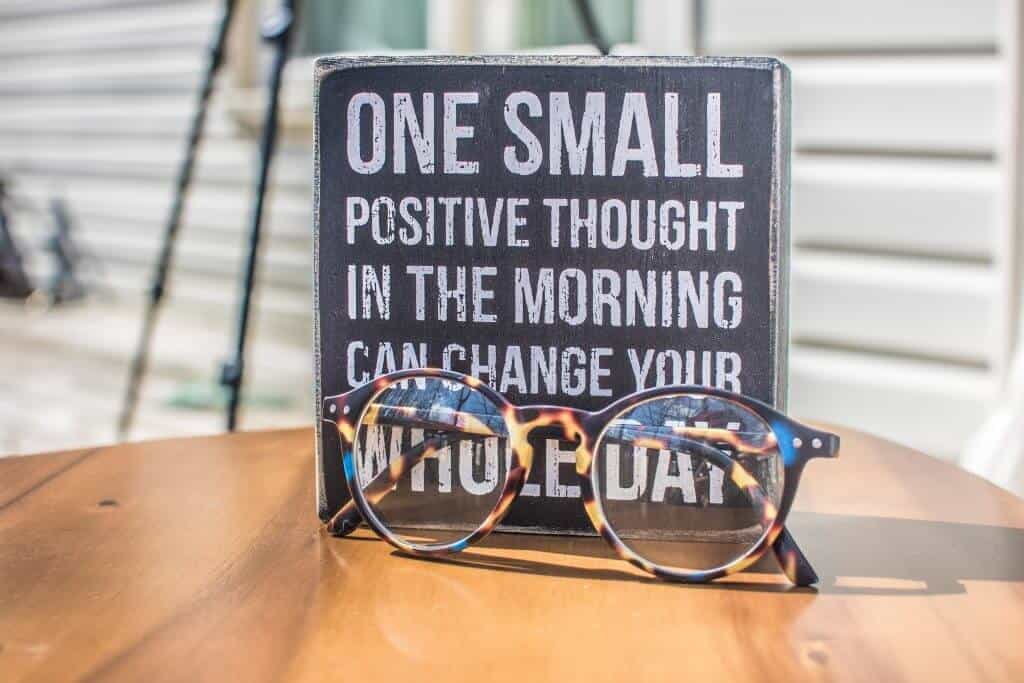
You know, it’s interesting, I think along the way, we certainly have had some challenges, but then we’ve also had successes. And I think when I sold the first bottle in Whole Foods in the Bay Area, that’s when I thought we’re off to the races. It’s going to be an overnight success, right? The secret is that we weren’t an overnight success. Even though we’re the largest independent non-alcoholic beverage in the country that doesn’t have a relationship with Coke, Pepsi or Dr. Pepper, or Snapple, I still consider us. It took a long time to build it, and it ends up that most successful companies and kind of are building a brand that has staying power are probably older than even you would imagine. I mean, I still run into people who have never heard of Hint. I find it hard to believe because I live and breathe it, and it’s in lots of stores that I go to, but some people don’t go into stores, right? Indeed, through the last year with the pandemic, maybe that’s even increased to some extent. But it’s something that I think I’ve also felt that I would have this almost high of saying, “Okay, we can do it, it’s all great,” and then something else happens. Where your regional guy in San Francisco then decides to go to another company, and then all of a sudden you’re like “Ugh,” then you have a low, right? And then you have to come back up because you got to train somebody, and you got to go through this. And that is the story of the beverage industry, I think, but also, it’s this constant juggle.
But somebody said something to me before actually launching our first bottle, this guy, Josh Dorf. I’ll never forget, he was sitting at my living room table. He had a company that his father started that was the first organic whole wheat flour company. Of course, I wanted to talk to him because he was like “the mecca.” He had done it, and he had gotten into Whole Foods. I thought, “When am I going to get into Whole Foods?” And he said something to me that I still have sitting in my head as a great learning memory, which is that this is pick-and-shovel work. And I remember writing down, “Pick-and-shovel work.” And then I thought, “Wait, what do you mean by that?” And he said, “You will get into Whole Foods one day, and you’ll get into lots of other stores, and you’ll have lots of success. But the most important thing to do is never feel like that’s the only game in town. Don’t put all your eggs in one basket.” And I made mistakes after that, putting all my eggs in one basket and multiple times, right? And I think or maybe not all in one basket, but the majority of them all in one basket, and then it went away.
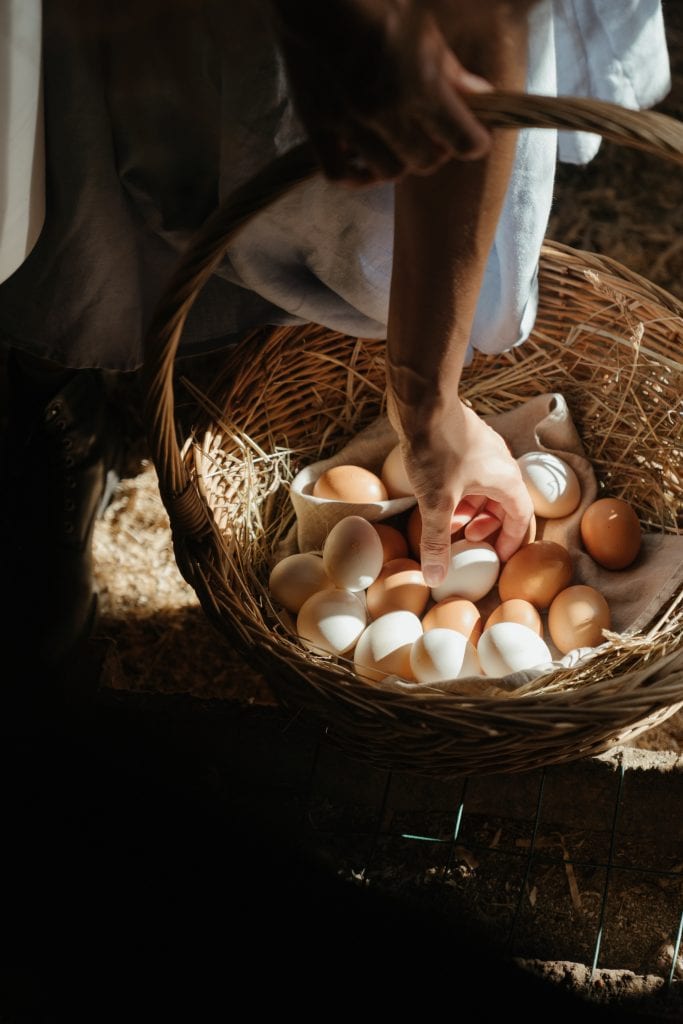
I think that that is such an important lesson that if you get sort of enamored by a brand or a partnership, and you say, “Oh, this is comfortable. This is super fun to hang out here.” And throw all your marketing dollars in there, do this because this is all great. But if it goes away tomorrow, then it’s not so great. And so I think diversifying and to some extent what I’ve shared with entrepreneurs, which is sort of an extension of that statement, is that having relationships that you care so much about that you are enamored by, whether it’s at Whole Foods or Starbucks or whatever, it’s great to have those. But get into positions where you can visualize what life would be without them because they may decide that they’re going to do something for their business that’s better for their business. And again, that’s something that you’re like, “Oh, no, we have a great partnership. We’re all good. They’re all nice.” But it happens, right? Sometimes, those things because you ultimately care about them because you had all your eggs in that basket or too many of them in that basket. And so I think that that is an important lesson. And I think you can even extend that into, frankly, how you service the customer.
It’s a life lesson, I think. It’s something that you can apply across your financial state. Like if you put all your liquid assets into crypto, for example, oh, my goodness, you’re so exposed. Or if you’re relying on all your traffic coming from organic search from Google, and then there’s an algorithm update, and you get wiped out. So I tell my clients, “You need more diversity.” Yeah, SEO is fantastic, and you’re crushing it with regards to organic search, but what about some other channels? What about having another website? If you’re relying on one website to produce all your revenue, and you’re relying on one traffic source, and that’s Google organic, you are incredibly exposed.
You need to hire people who are better and smarter than you. You learn from them as much as they learn from you. Share on XI agree. And I think during the pandemic, too, I think, for example, if you’re relying on, let’s say, you didn’t have the option for consumers to go and shop from you on your website. That was crazy because there were systems that were beyond being overwhelmed by the pandemic. And during March, just as an example, software systems were used to allow the people working in the stores to know that they needed to reorder. Of course, this came after that story that you shared with Whole Foods, that everything they’ve got in the store is sitting in the software. Well, the software couldn’t keep up with the demand in certain categories, like water, or toilet paper, or bleach, or whatever. So it wasn’t smart enough to know, “Oh, we’ve got to reorder.” And so a lot of people said, “Oh, my gosh, there aren’t these products in the stores.” And then the people in the store are saying, “Well, my systems are telling me that I don’t need to reorder, but I just don’t have it on the shelf. “And so if you were sitting in that pickle, then you were kind of screwed. And so we had our direct to consumer business, but in addition, we also knew just coming, I guess from technology, that software sometimes has a hiccup, and it hasn’t seen certain things, and they didn’t know how to solve this. And so what we did was we got on the phone and called all these stores, and we said, “Hey, we don’t know what’s going on. We know you’re challenged right now. Can we just send in a truck of water, and we’ll stock the shelf, and we’ll figure out the payment stuff later.” And we’ll even send in people that are going to go and stock the shelves. And like 90% of them said, “I’m in, thank you so much,” and “We’ll call you in a couple of weeks once we figure out what’s going on.”
That’s amazing, so forward-thinking.
The basic stuff, right? And how many manufacturers didn’t do that? They just stopped. And they said, “Oh, gosh, I don’t know what’s going to happen.” We were like, “Well, how do we fix it? What can we do?” which I think is something that is also just so key.
But what you did in retrospect is just common sense. And it sounds like you’re kind of downplaying how big of a deal that was. But common sense isn’t that common, especially when your reptilian brain is running the show because you’re in crisis mode.

Totally. And I think it’s also something that maybe is a little bit unique to people who have sort of grown up in a system where they spend too much time teaching as well. Where you aren’t used to rolling up your sleeves and kind of getting dirty. And really understanding kind of how the processes work. I think that that’s another thing that I’ve been conscious about. And part of it, I think it is kind of growing up in startups too, where there are only ten people in the room, and you’re doing a little bit of everything, and then you go hire people to finally take on that job. I know every single role in my company. I know SEO, certainly not as good as you, I know how to manufacture this product, I know a little bit about everything enough to get me in trouble, as I always say. But I think that even when I feel like I am a bit disconnected from something, I want to go in and learn. And again, I think that that is my curiosity, but that’s my realization, too, that when things are challenging, I can catch up pretty quickly if I don’t have to start from scratch.
Yeah, totally. So we’re almost out of time, but I wanted to ask you one more question. It’s kind of almost a spiritual or metaphysical question. Is there a particular moment, lesson, challenge, or something that gives you goosebumps whenever you think about it? Because I recall Brian Smith, the founder of Uggs, telling a story, which he was on the podcast. And he looks for these goosebump moments. He’s like,” Oh, that gave me goosebumps,” like, file that one away because that was like a direct connection with the Creator or that was like a download or there’s something significant there. So I’m just curious if you can think of any kind of goosebump moments or lessons or anything.
You know, I would say that there was one moment in 2017 that I had been. In 2012, I was part of this program by EY, formerly Ernst & Young, Winning Women. It’s sort of for smaller companies that are kind of up and coming. And at the beginning of 2017, EY had reached out to me and said, “Hey, you’re a bay area company. We want to throw you into the mix of looking at companies that we really think are entrepreneur of the year.” So Silicon Valley is made up of tech companies, right? I mean, that’s what it’s known for. And there’s plenty of amazing examples of great tech companies in Silicon Valley that are bigger, all of these things. And so I got down to the final five. We had a big event where I had a table. I had my friends there. I didn’t even tell my friends. I just said, “Will you come to this? It’s a great time to get dressed up.” So I’ll never forget my very oldest friends looking through the little pamphlet and seeing my picture in there and saying, “Wait, you’re up for this award.” And I said, “No, I’m not getting it. Don’t worry.” And my husband said, “Do you have a speech?” And I said, “Don’t even think about it. We can all have cocktails and have a good time because there are lots of other companies that you’ve heard of in technology that are here as well, and they’re going to get it.”
Hang out with people that satisfy your curiosity along the way. Share on XAnd I got it. And I got called to the stage, and I did not believe it. I still like to talk about it. That’s my goosebump moment when I just didn’t think about it. And I think it also took me back to being humbled because I think that’s the other thing. I felt like this has been a journey, and the journey isn’t over yet. And so to me, an entrepreneur of the year was like a pedestal where that person has done it, and they are of a huge region with lots of people that are awesome and hear there were people who had said no. You’ve done something hard, and you’ve also done something where not many women are supposed to be able to do. And so anyway, when I got up on stage, I did not have the speech. Thankfully, I did not have a lot of cocktails in the midst of it either. It was interesting because my acceptance speech was truly from the heart, and I spoke about supporting the crazies. And the people that have ideas that you haven’t thought about and that you aren’t sure how they’re going to do it. And I said, “Because those are the ones that you’re missing, not only on the opportunity but also the ones that could change the world.” And it had a standing ovation, and it was like crazy. And you could tell it was really from the heart. But I would say that was when I finally felt for whatever it’s worth, recognized for all the hard work. But I wasn’t even looking for it.
It’s a great validation.
It is. I think when you don’t feel like you deserve it, that you look around the room, and you think, “Wait, why didn’t they get it?” It’s an interesting feeling.
Sounds a little bit like imposter syndrome.
Well, I think it is, and I didn’t deny that I had built something with my team pretty great. But it was. Also, I think, for me, I felt like there were a lot of other great people there too, that had done something that maybe I would have voted for. And I think it speaks to great entrepreneurs. I think that they don’t feel like they’re done, that they’ve done something. They are constantly putting themselves into positions of how we can be better and how we can go to places where we didn’t plan. And I think it is really what this journey is all about
Breaking down doors, or breaking glass ceilings, breaking glasshouses, you’ve done all of that.
Totally.
And we’ve talked a couple of times about the crazy ones – Steve Jobs’ quote “Here’s to the crazy ones”. It is such a great quote. I know that our listeners will get a lot out of it if they’re not familiar with it or haven’t memorized it.
I agree.
If our listeners want to read your book, Undaunted, where should they go? And if they want to follow you, learn from you beyond the book, where should they go for that as well?
Yeah, so the book is called Undaunted: Overcoming Doubts and Doubters, and you can go to KaraGoldin.com, or you can go to Amazon and Barnes & Noble and lots of other booksellers as well and pick it up or Audible as well. And all over social @KaraGoldin. Please come by and say hi, and hopefully, you’ll have a chance to read the book and let me know what you think.
Awesome. Thank you, Kara. This was fabulous.
Thanks so much.

